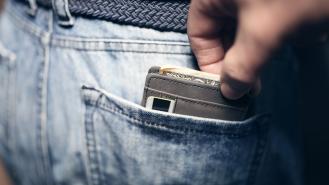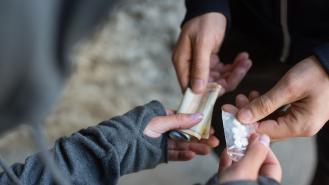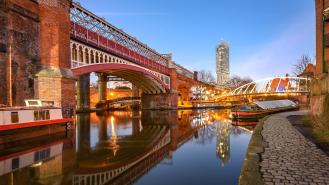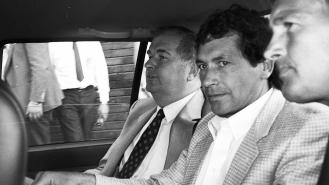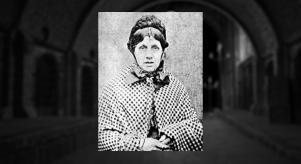
Hiding in plain sight: Money laundering on British high streets
Most folks make sure that their clothes are clean before they wear them out in public. A pristine white t-shirt and a stain-free pair of jeans are unlikely to draw any funny looks from people. This is good news as no one needs the unwanted attention and shifty glances that looking dirty brings. The same is true with criminals and their money.
Crime’s illegal. Hopefully, everyone reading this is familiar with this particular tenet of law. As such, any money made from illicit activities is ill-gotten. Criminals shouldn’t legally have it and, so, the state can seize it. Which makes all that hard work really rather pointless. Something has to be done.
That something is money laundering. As the name suggests, it’s effectively cleaning. But instead of dirt, grease and buffalo wing sauce that needs cleaning off as with our earlier example, it’s the trail of crime that needs to vanish.
The UK Act of the Parliament known as the Proceeds of Crime Act 2002 clearly and concisely defines what money laundering is. It calls it 'the process by which the proceeds of crime are converted into assets which appear to have a legitimate origin, so that they can be retained permanently or recycled into further criminal enterprises.'
Money laundering is a huge business right across the word but in the UK, the numbers are incredible. The Home Office, HM Treasury and the Serious Fraud Office have some rather eye-opening figures. Between them they claim that more than £150 BILLION worth of dirty cash is cleaned every year in Britain alone, costing the country almost $40bn.
A lot of that money - in fact, most of it, comes from overseas. From Russia and, to a lesser extent, mainland Europe. A good percentage of it is laundered via advanced high finance schemes and via advanced technologies such as cryptocurrency. But a sizeable amount of the $150bn is cleaned on our high streets, in every town and city in this country.
Here are the six main ways it happens:
Banks
The level to which some high street banks have - and continue to - launder money for Russian criminals is almost staggering. Tens of billions of pounds comes in and out of UK banks, in a variety of different ways. Offshore accounts, shell firms and sophisticated and intentionally complicated processes sit on one side of the spectrum. While flat-out unquestioned money transfers of extremely significant figures sit on the other. Only a few years ago, ‘The Global Laundromat’ scandal involving banks such as HSBC, Lloyds, Barclays and The Royal Bank of Scotland was uncovered.
The scariest thing? This is only the tip of the iceberg. The little cash that’s tracked being cleaned through the banking system only hints at the scale of what is an unfathomably large shadow banking system that exists throughout the criminal world. It may exist to benefit criminals, but corrupt politicians, officials and bankers keep the cogs oiled.
Bureaux de change
Closer to home and the UK’s vast and intricate network of drug-dealing gangs need to clean their cash too. With both their inner city and county lines operations generating significant bundles of paper money, the dealers at the head of the snake need to launder plenty. The good news for them? They don’t need contacts in The City, the Moscow underworld or the Kremlin. They can clean their cash down their local high street.
Small, often kiosk-like businesses exist in holes in the wall or within larger retail units. They’re usually staffed by one person and are technically known as ‘money services businesses’ (MSBs). Primarily they’re there for customers to change currency for foreign trips or wire cash abroad. You’ll be familiar with the yellow and black metal signs saying ‘Western Union’ and ‘MoneyGram’. Inside, you can transfer cash often with little or no documentation or proof of source for the funds.
Tens of thousands of these transactions happen across the UK every day. So many that it’s extremely difficult for authorities to track. In fact, the whole system is fairly messy and unchecked. For the small commission, it’s possible for a criminal to swap dirty cash for a clean amount in a foreign bank account. For another small commission, that sum can then be sent back to the criminal. It’s quite literally a small price to pay for the enormous amount that gets laundered this way.
Fronts
Now onto more ‘traditional’ money laundering set-ups. We’ve looked at two ways to clean cash on the high street using financial processes and systems, now let’s get into good old-fashioned laundering… Fronts.
To the untrained eye, it’s a business like any other. But pay close attention and you may find yourself wondering, ‘how does that place stay open?!’ You can probably think of a few examples from your own high street. There’s rarely anyone in there and you know the prices for the goods or services are low and offer minimal profit margins. So just how do they turn enough profit to pay their rent, business rates and salaries? Well, therein lies the rub...
Money laundering fronts exist all across the UK. They may or may not be in every single town or city, but it’s fairly certain you’ll know of at least one high street unit which is either propped up by criminal enterprise or in existence purely to clean dirty money. They’re often, but not always, cash businesses. They require very little overheads, are often staffed by foreign workers and deal in small and frequent transactions.
Here are some of the most common money-laundering fronts on British high streets:
● Nail bars - Manicure salons have something of a reputation in law enforcement. While most privately owned and operated businesses are perfectly legal and reputable, an increasing number are being set up and run by Vietnamese organised crime gangs. Such nail bars are generally staffed by illegal workers who are often underpaid or not paid at all. Modern slavery isn’t the only crime being committed, often large sums of money made from farming and the wholesale selling of cannabis is cleaned through the business.
● Barbers - While most hairdressers and barbers are purely in the trimming game, it’s not unheard of for some to operate primarily for washing criminal money. Of course, broken card machines are a possibility and the associated fees with card transactions are annoying, but think… if your barber insists on cash - well, there just may well be a reason for it.
● Tanning salons - While slightly pricier to set up than, say, a nail bar, tanning salons have nonetheless proven popular as money laundering fronts down the years. Simple businesses that require minimal staffing, their basic nature makes them appealing to criminals. They spray your backside orange while cleaning thousands in cash a week. Simple but effective.
● Car washes - Where better a place to get something cleaned than a car wash, eh? Now, many car washes are parts of chains or franchises, these are extremely unlikely to operate as fronts. We’re talking independent places without expensive car cleaning rigs. Hand wash businesses in cheaper parts of town. They may also employ illegal workers.
Now, it goes without saying that most banks, MSBs, nail bars, barbers, tanning salons and car washes are perfectly legitimate and above board. So don’t go assuming you’re involving yourself in illegality the next time you get a manicure, trim or have your alloys buffed. But look out for the signs and you may just spot them when you see them...
We don’t know about you, but we’ll never look at the high street in quite the same way again.
5 money laundering cases that made headlines
All too often, money laundering goes on under the radar. But sometimes, the ugly truth of people’s financial skulduggery is dragged into the media glare.
1. The Wachovia cartel scandal
The misuse of currency exchange offices to shunt illicit funds across borders was highlighted in 2010, when one of America’s longest-established banking organisations was formally reprimanded for its part in a multi-million-dollar laundering operation.
With a history dating back to 1879, Wachovia was a trusted name in financial services. So the whole banking industry was shocked when it transpired that Mexican and Colombian drug cartels had been wiring money through currency exchange bank accounts held by Wachovia, in order to distribute their ill-gotten gains and make extravagant transactions. These included the purchase of private jets used to transport tons of cocaine from Mexico to the US.
Criminal proceedings were brought against Wachovia, which was slammed by a federal prosecutor for its ‘blatant disregard’ for banking laws and for giving ‘cocaine cartels a virtual carte blanche to finance their operations’. It made a settlement with the authorities, paying $110 million to cover the cost of transactions related to drug smuggling and another $50 million as a fine.
2. The Manchester money mules
Money laundering operations don’t have to be on such an epic scale to have a significant impact on victims. In 2022, a pair in Manchester – Naeem Khalid and Abiya Hussain – were sentenced for their roles as money mules for ruthless fraudsters, in a case that highlighted just how prevalent laundering is.
Money mules are those who handle and transfer stolen money, and the pair’s activities came to light when Hussain entered a bank and asked them to exchange £800 worth of damaged notes. Police were notified and discovered she had several bank accounts that had received thousands in mysterious deposits. These turned out to be money ripped off from companies that had fallen victim to email scams and other types of fraud.
Hussain’s phone messages led detectives to Khalid, who was also shown to have multiple accounts receiving money which had been stolen from victims including solicitor firms, manufacturing businesses and even a care home. Khalid was jailed for 46 months, while Hussain – a single mum working part-time at Morrisons – was handed an 18-month community order.
3. The Singapore dirty money case
The Khalid/Hussain case is an example of how money laundering can be carried out by seemingly ordinary people against banal backdrops. A polar opposite example is the case that exploded in Singapore in 2023, when police seized hundreds of millions of pounds worth of luxury items – including supercars, deluxe watches and literal gold bars – as part of a mammoth anti-money laundering crackdown in some of the region’s most upscale neighbourhoods.
The swoop has shed new light on the darker side of Singapore, whose plethora of tax exemptions and business-friendly laws, buzzing casino scene and sprawling property market, have made it a haven for those looking to disguise illicit gains amid legitimate activities.
The raids led to the arrests of 10 Chinese nationals suspected of laundering the proceeds of scams, illegal online gambling operations and other criminal enterprises carried out overseas. One of the convicted launderers had jumped from the second-floor balcony of his house trying to evade police. He survived the fall and became one of the first to be jailed when sentences started being handed out in April 2024.
4. The gang of six
Another British case involving money mules saw six people sentenced for their part in laundering money made by ruthless rogue traders who targeted elderly victims in Wiltshire.
One victim originally just wanted guttering work done, but had been persuaded to pay up to £55,000 for the installation of a new roof he didn’t need. The money went into the accounts of two people, Serena Hodge and James Stinchcombe, who kept some of the funds as a kind of commission for their banking services, handing the rest to the traders in cash.
Another elderly victim paid just over £40,000 for roofing work into the account of Serena Hodge’s partner, Patrick Egan. This followed what was originally a much lower quote for guttering work, but the rogue traders kept jacking up the costs, with the victim making further payments into the account of another launderer, Arfan Asif.
In a particularly twisted moment, another fraudster named Liam Ben Turner-Belshaw approached the victim, claiming to be from HMRC and asking for another £74,650 towards ‘investigation costs’. This money was paid into the account of yet another member of the group, Claire Pemberton.
In 2023, all six of them were sentenced for money laundering and fraud offences, though only Patrick Egan received jail time.
5. The carpet-selling moneyman
In 2024, the owner of a rug retail company was sentenced to eight years in prison for operating a money laundering operation behind the façade of an apparently legitimate business.
Asghar Gheshalghian operated the sham company from an office in north London, posing as an ordinary entrepreneur while actually taking payments from would-be asylum seekers trying to make it to the UK via small boats and trucks. Once the migrants arrived, he would release the money to the people-smuggling gangsters, keeping some as commission.
During the investigation into his activities, Gheshalghian was recorded bragging that ’70 to 80 per cent of our business is illegal’. Officers would later trace payments amounting to over £1.6 million, making him guilty not only of money laundering but of facilitating the highly dangerous trade in human lives.

